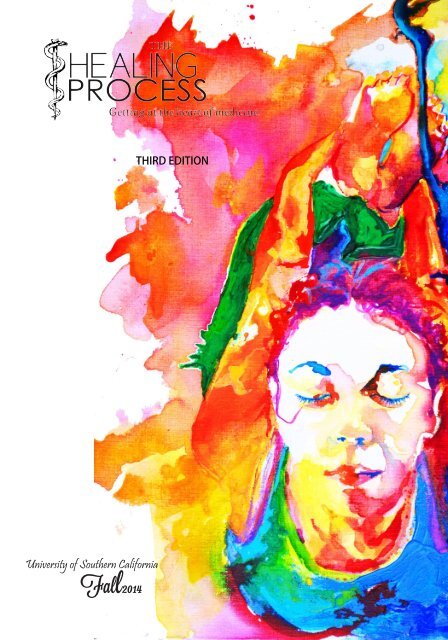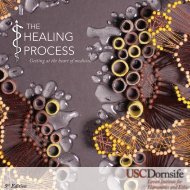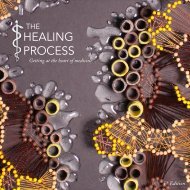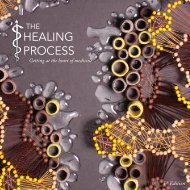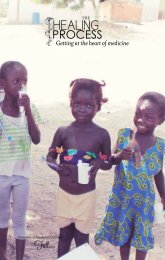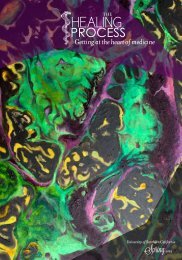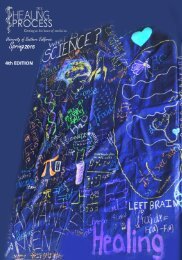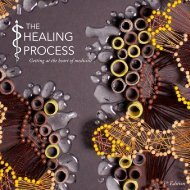final_thp_3rdedition
Create successful ePaper yourself
Turn your PDF publications into a flip-book with our unique Google optimized e-Paper software.
THIRD EDITION<br />
University of Southern California<br />
Fall2014<br />
PAGE | 01
Contents<br />
Dear Readers,<br />
Thank you for picking up a copy of<br />
the third volume of The Healing<br />
Process! In this edition we’ve<br />
included two new sections. The first<br />
is an interview section, in which I<br />
had the honor of conversing with<br />
Owen Bennett Jones, a BBC News<br />
Correspondent who has covered<br />
various health care issues all across<br />
the world. The second section is a list<br />
of suggested books that we hope each<br />
and every one of you decides to read.<br />
These books are thought provoking<br />
and have definitely altered the way we<br />
at The Healing Process view medicine.<br />
Each approaches medicine by telling<br />
stories that captivate the audience, and<br />
allows us to understand medicine from<br />
a different perspective. Literature,<br />
as witnessed in these books, has the<br />
ability to reach a wider audience<br />
than scientific analyses. Through art,<br />
literature, poetry, and prose, the most<br />
difficult subjects to discuss can be<br />
conveyed more meaningfully.<br />
FROM THE EDITOR<br />
With each progressive volume, we<br />
have tried to expand on those previous<br />
in terms of layout and content to<br />
make this a legitimate facet of USC.<br />
I feel that we’ve made great strides in<br />
accomplishing that, but there is still<br />
a great ways to go, and so I ask you<br />
readers for your help: please spread<br />
the word. By doing so, we can allow<br />
this to grow further and capture far<br />
greater attention.<br />
I wish the best to the new editorsin-chief,<br />
Nicole Lau and Janis Yue,<br />
whom I know will continue to foster<br />
its progress. I thank my staff for<br />
the past two years, the physicians<br />
and directors that have guided us,<br />
and most importantly all those that<br />
submitted. A special thank you goes to<br />
our advisor Dr. Erika Nanes.<br />
Best Regards,<br />
Kush Gaur<br />
EDITOR-IN-CHIEF<br />
Interview with Owen<br />
Bennett Jones<br />
Conducted by Kush Gaur<br />
09<br />
Manic Depression<br />
Non-fictional prose by<br />
Brendan J. Mauch<br />
Tanzania and<br />
Ecuador: Medlife<br />
Photographs by Nicole<br />
Lau and Edward Ng<br />
Second Hand<br />
Dementia /<br />
Mother-Father-<br />
Dementia...and Me<br />
Poems by William<br />
Brochinsky<br />
03<br />
Brain<br />
Painting by Kristen Chen<br />
13<br />
25<br />
29<br />
Frayed Ends<br />
Poem by Cody<br />
Kaneshiro<br />
23<br />
11<br />
Clinic Trip<br />
Day 3<br />
Photograph<br />
by Lizbeth<br />
Medina<br />
27<br />
WO/ANDER<br />
Artwork<br />
by Richelle<br />
Gribble<br />
33 35<br />
Jon Lee<br />
De novo<br />
by Loranna<br />
Grigoryan and<br />
Cover Art<br />
by Shreya Bansal<br />
Books We<br />
Recommend<br />
37<br />
Painting by Nicole<br />
PAGE | 01 Lau/ List<br />
PAGE<br />
of Editors<br />
| 02
OWEN<br />
BENNETT JONES<br />
A JOURNALIST’S PERSPECTIVE ON GLOBAL HEALTH<br />
INTERVIEW CONDUCTED BY KUSH GAUR<br />
Owen Bennett Jones is an award-winning British<br />
journalist and co-host of BBC Newshour. As a BBC<br />
Correspondent he has been based in 60 countries around<br />
the world, including those in the Middle East and South<br />
Asia, with many of his articles focusing on Pakistan. In<br />
terms of health care, he has covered polio vaccinations and<br />
mental health in Pakistan, and mortality rates in Iraq. I<br />
had the pleasure of meeting him at a USC Global Health<br />
event at the Keck School of Medicine. I interviewed him in<br />
March 2014 when Pakistan was in the midst of an antipolio<br />
campaign that was continually being challenged by<br />
the Taliban. Today, the situation seems to be just as dire.<br />
“ You need to be able<br />
to absorb creative<br />
material.”<br />
PAGE | 03 PAGE | 04
THE INTERVIEW<br />
KG: Do you believe that creativity has a place<br />
in medicine?<br />
OBJ: Doctors have an incredibly important<br />
role in society dealing with extremely acute<br />
human problems, and to equip them to do<br />
that they need to understand the full range of<br />
human emotion and the human condition.<br />
The best way to do that is to be open to<br />
literature, art, and creative output.<br />
KG: Does this translate into better doctors?<br />
OBJ:This would make for a much better<br />
doctor. Obviously the field now is all about<br />
the techniques, science, and knowledge that<br />
you have to have to cross so many different<br />
aspects of medicine. But at the end of the day<br />
you’re dealing with people, and if you want to<br />
understand people, then you need to be able<br />
to absorb creative material.<br />
KG: I’d like to discuss your career in Pakistan<br />
and the Middle East. You’ve been to so many<br />
places all across the world, but why is Pakistan<br />
your main focus?<br />
OBJ:Pakistan is a very complicated place,<br />
but it is also a very welcoming place for a<br />
journalist to work because people are very<br />
open. They’re very hospitable and willing to<br />
discuss politics, and it’s almost impossible<br />
not to discuss politics with Pakistanis. It’s<br />
simply a place where people gossip and talk<br />
the whole time, so it’s genuinely a place where<br />
people are willing to be open with you. It’s<br />
also an incredibly important place and a very<br />
complicated place, so it takes a while to get<br />
your head around it.<br />
KG: Pakistan is currently in the midst of a<br />
polio outbreak, and I just read about how 12<br />
people were killed by a Taliban militant bomb<br />
attack aimed at a polio vaccination team.<br />
Why is there this campaign against polio<br />
vaccinations in Pakistan?<br />
OBJ:First, there are differences between<br />
the Afghan and Pakistan Taliban, and what<br />
attitude they each take toward the polio<br />
vaccination. The Afghan Taliban has been<br />
much more sympathetic to people coming<br />
in to give the vaccine for polio. The Pakistan<br />
Taliban, on the other hand, actually discussed<br />
it for years and took a clear decision, I think<br />
in 2012, to say that it would oppose any<br />
vaccination campaigns. This was sparked<br />
by the assasination attempt of Bin Laden,<br />
which involved a Pakistani doctor pretending<br />
to be vaccinating the children in the Bin<br />
Laden household to get their DNA. That<br />
contributed to the Taliban hostility to polio<br />
vaccination, and the result now is that you<br />
have quite regularly, as you say, nurses and<br />
the police murdered as they try to give this<br />
vaccination out. The consequences of course<br />
are that there are cases where this campaign<br />
is spreading. One of the Jihadi fighters<br />
actually took it to Syria, and there was a case<br />
in Kabul as well. So the consequences of<br />
this Taliban action are beginning to be felt<br />
internationally.<br />
KG: Religious leaders also denounce the<br />
vaccinations as well. Is this due to the belief<br />
that it sterilizes males?<br />
OBJ: Before the Bin Laden issue, there is<br />
the question of whether vaccinations are a<br />
Western plot to undermine Islam, leading to<br />
doubt about polio vaccinations. Some of the<br />
religious leaders in the northwest of Pakistan<br />
do say that it is in fact an attempt to sterilize<br />
people so there will be a smaller population<br />
of Muslims in the future. When you hear stuff<br />
like that, you wonder whether they are just<br />
trying to stir something up with the issue.<br />
But in fact, there is quite significant evidence<br />
that they do think that that is true, and I’ve<br />
met some of these people and have talked to<br />
them. It’s really due to the fact that they are<br />
uneducated. It is quite possible that these<br />
people genuinely believe that it is a US plot to<br />
sterilize, rather than an attempt to save their<br />
children.<br />
KG: Do you think the West is doing a good<br />
job with the mass vaccination campaign, or is<br />
there a better way of doing it?<br />
OBJ: Oh, well no I don’t<br />
think that they are. It has<br />
gotten to a very difficult<br />
point now. The UN<br />
and many people very<br />
sympathetic to Pakistani<br />
culture are involved now.<br />
These people are actually<br />
trying to get this right. They<br />
are coming in without a<br />
colonial imperialistic attitude, and rather<br />
with a pretty sophisticated understanding on<br />
the ground, with knowledge of the different<br />
strands of opinions in the Taliban, and with<br />
an idea of which religious leaders they can<br />
talk to in order to try to change and shift<br />
the position. So this polio vaccine is a long<br />
running campaign and has reached a pretty<br />
sophisticated level of understanding. The<br />
problem is really not with the attitudes<br />
of the people trying to get these children<br />
vaccinated; the problem is with this religious<br />
movement.<br />
KG: Do you think this will change any time<br />
soon?<br />
OBJ: No, I actually think it might be going<br />
the other way. The Taliban are going to the<br />
northwest of Pakistan. There has just been a<br />
dialogue with the government, which ended<br />
“ You can’t just go<br />
in with your own<br />
ideas and believe<br />
that everyone else<br />
agrees with them<br />
and shares them.”<br />
up with the Taliban basically having an even<br />
stronger position. They’ve been terrifying<br />
journalists within the past few weeks and<br />
months, and more and more people are more<br />
reluctant to criticize them. In fact, I think this<br />
terrible incident, where these poor people<br />
died, will be more prevalent. As more nurses<br />
and police go out, more will be killed.<br />
KG: Do you think that the ceasefire will help<br />
any?<br />
OBJ:The policy against the polio vaccines is<br />
still in place. Frankly, there have been over 10<br />
ceasefires before and none of<br />
them have been honored, so<br />
there is no reason to believe<br />
that this one will be honored<br />
either. And even if it were<br />
honored, I don’t think it<br />
will solve anything. All that<br />
happens is that people get<br />
killed, and if the Taliban are<br />
embarrassed, then they will<br />
just say that someone else<br />
did it.<br />
KG: So all this plays into a cultural competency<br />
situation, where journalists have to deal with<br />
different customs and beliefs in a place like<br />
Pakistan. There is naturally a correlation in<br />
medicine, especially in diverse cities like Los<br />
Angeles, where doctors have many people that<br />
lead their lives differently. So how do you as a<br />
journalist deal with this, and how do you think<br />
that doctors should deal with this?<br />
OBJ: It has to do with the correct attitude.<br />
You can’t just go in with your own ideas<br />
and believe that everyone else agrees with<br />
them and shares them. It does take a little<br />
bit of hard work to try to get journalists<br />
and doctors to actually understand what<br />
foreign cultures consist of. Too often<br />
Western journalists tend to go to developing<br />
countries with basically the UN Human<br />
Rights Charter in their back pocket and<br />
PAGE | 05 PAGE | 06
then when each country falls short of what<br />
they’ve read, they start yelling at the people<br />
for being inadequate and not matching the<br />
standards that they think is appropriate. I’ve<br />
never really liked that. It always seemed to<br />
me to be more productive for journalists to<br />
go abroad with an attitude of more to learn<br />
something rather than preach. If you do that,<br />
then you are actually going to have a more<br />
rewarding experience, and the work that you<br />
produce will be more interesting. I have seen<br />
journalists arrive in countries and completely<br />
misunderstand what is going on because<br />
they are seeing it basically through their own<br />
eyes. Similarly, and probably<br />
more importantly, doctors can<br />
go in and misread symptoms,<br />
and misread what people are<br />
going to do when you tell them<br />
to take a course of action to get<br />
themselves better. This could<br />
have a negative impact on their<br />
lives. It is very very important to<br />
be humble about this and have<br />
an open attitude about different<br />
countries.<br />
KG: Now I want to talk about healthcare<br />
systems. There have been studies that say the<br />
UK has one of the more efficient industrialized<br />
health care systems. As you know, the US is<br />
performing an overhaul of its health care<br />
system with ObamaCare. How would you<br />
compare the US and UK healthcare systems?<br />
OBJ: That’s quite a difficult question for an<br />
outsider to answer because the systems seem<br />
to be so different over different parts of the<br />
country. In the UK we have a unified system,<br />
the National Health Service, which was<br />
set up after the Second World War despite<br />
certain opposition from doctors. And as the<br />
minister who did it said, he showered the<br />
doctors with gold to get them to agree to<br />
it. The result is that we have a system that<br />
is taxpayer funded and completely free in<br />
terms of use. For instance, I had my son<br />
cut his hand and he needed a few stitches.<br />
When I took him in, no one even asked our<br />
names or address, and within an hour the<br />
stitches had been done and we were good to<br />
go. No questions asked, no forms filled, no<br />
fees paid. It is a remarkable system. There are<br />
problems with it though. Particularly with<br />
nursing standards at the moment, which<br />
are distressingly bad in some places. There<br />
are also other issues with the service. One<br />
of difficulties is that the politicians feel an<br />
obligation to have an exactly similar standard<br />
of care all over the country, which makes it<br />
really difficult to change anything because<br />
it has to change at the<br />
same speed everywhere.<br />
There are political<br />
problems managing<br />
it, but nonetheless it<br />
is something that no<br />
politician dares to attack<br />
in the UK. Mrs. Thatcher<br />
started nibbling away at<br />
its edges when she was<br />
in power and came up<br />
against a very strong<br />
resistance. Since then, any prime minister<br />
from any party has committed themselves to<br />
preserving the National Health Service and<br />
expanding its funding as much as they can.<br />
“ No questions<br />
asked, no forms<br />
filled, no fees paid.<br />
It is a remarkable<br />
system. ”<br />
KG: Do you think the US or UK can learn<br />
something from other nations’ health care<br />
systems?<br />
OBJ: Yes I think you can. I think you can<br />
learn to appreciate how lucky you are to<br />
have a system that works relatively well. In<br />
these systems that are less regulated and<br />
less formalized, for example in Pakistan and<br />
Egypt, it is my observation that hospitals<br />
are funded by the community, so you’ll<br />
have rich patients expected to give very<br />
substantial amounts of money for their<br />
treatment in order to pay for poorer patients.<br />
You have doctors working for very low<br />
salaries compared to what they could get in<br />
the private sector and other opportunities.<br />
There is a real sense of the public service of<br />
doctors; a community valuing what they do,<br />
supporting what they do, and paying for what<br />
they do. In that sense it is a rather inspiring<br />
thing to watch. These doctors are working<br />
in absolutely atrocious conditions, with<br />
inadequate facilities, and with the amount<br />
of people that they have to deal with. But<br />
still, there is something about it that these<br />
communities can be proud of.<br />
In Karachi recently, I met a doctor in the<br />
emergency facility where the walls were<br />
covered in bullet holes. She said that a<br />
gunfight broke out, and a person who was<br />
meant to be killed by a gangster operation<br />
showed up in the hospital and was followed<br />
in by the gunmen. She’s had the most<br />
atrocious situations. For example, a big<br />
bombing took place where the whole place<br />
was stacked with people in very serious<br />
medical conditions, and there she was in the<br />
midst of all this. She is a genuinely heroic<br />
woman in my view, keeping some level of<br />
sanity to the whole thing and dealing with<br />
these people with humanity, kindness, and<br />
proper professional care. And you see a<br />
woman like that and what an enormous<br />
contribution she’s making to her city. She<br />
comes from a family that all live abroad and<br />
she could go live abroad with them, but she<br />
chose not to. She said, ‘this is my city, I’m<br />
going to live here, and I’m going to make my<br />
contribution.’ The complaints that patients<br />
make in our setup are so aggravatingly petty<br />
when you compare them to what most people<br />
in this world cope with.<br />
KG: Many undergraduates and medical<br />
students today want to go abroad and<br />
volunteer, so would you say it’s important to<br />
do such work in countries with such obvious<br />
health care inadequacies?<br />
OBJ:People will have different levels of<br />
tolerance for different situations. In general<br />
terms, it is my experience that the reason<br />
most people don’t go to interesting places in<br />
this world is because they are slightly underconfident,<br />
slightly nervous about it, and not<br />
quite sure what they will meet when they<br />
get there. Quite often they play it safe. That’s<br />
fine and there is nothing wrong with that,<br />
but the worries are normally exaggerated.<br />
Journalists obviously have to report on what<br />
goes wrong in these countries and what<br />
is newsworthy, which tends to give a false<br />
picture of what it is actually like to live in<br />
some of these countries. If you look at even<br />
the most difficult places at the moment, like<br />
Baghdad, where there are many bombings<br />
and where it is genuinely difficult, millions<br />
of people go about their daily business. Some<br />
places are indeed too dangerous to go to.<br />
Like I wouldn’t recommend anyone go to<br />
Syria at the moment. A lot of places, though,<br />
that you would think are quite difficult are<br />
actually fine. And especially if you were in a<br />
medical setup with all doctors looking after<br />
you, you can be confident enough that you<br />
are going to be safe for the period you are<br />
there. Don’t forget that if it gets too crazy,<br />
you can always leave. So I think there is<br />
great value in going to these places. You are<br />
contributing to people that desperately need<br />
medical attention, and you are also learning<br />
something about what the realities of the<br />
world are actually like.<br />
KG: Do you have any last advice for<br />
undergraduates or medical students at USC?<br />
OBJ: I don’t feel confident to give advice,<br />
but I was delighted to come to USC. They<br />
seem like a diligent and committed bunch of<br />
students, so all I can say to them is that they<br />
seem to be in a very good place and best of<br />
luck!<br />
A SPECIAL THANK YOU TO OWEN BENNETT JONES<br />
PAGE | 07 PAGE | 08
BRAIN<br />
A PAINTING BY<br />
KRISTEN CHEN<br />
“No experience is entirely isolated to one<br />
individual and it is because of this, that<br />
people fight for one another all the time.”<br />
PAGE | 09 PAGE | 10
frayed<br />
ends CODY<br />
KANESHIRO<br />
My anxiety took root<br />
Like weeds between concrete slabs—<br />
One by one<br />
did their leaves curl and unfold,<br />
their colonies blossomed<br />
like galaxies and supernovas<br />
and twinkling stars<br />
until one day<br />
those constellations became<br />
Stinging nettles<br />
That clung<br />
to every inch of my perception,<br />
so that the only color I saw<br />
was the angry scribbles<br />
of a ballpoint pen on paper<br />
drawn over and over<br />
and over<br />
and over again<br />
so that the lines were like<br />
tangled cords<br />
of an earphone set<br />
(God, how my heart pounded<br />
at that sight)<br />
My anxiety burned<br />
like a second-place trophy —<br />
annoying,<br />
pitiful,<br />
maddening<br />
with an ache that throbbed<br />
at the soft corners of my temples.<br />
That Anxiety<br />
became the itch on my back<br />
I couldn’t scratch,<br />
The leftover residue<br />
of a sticker that wouldn’t<br />
come off,<br />
My bloody fingers and the<br />
nubs of my fingernails<br />
always haunting me<br />
until I was nothing more than<br />
an ugly amalgam<br />
of disquieting woes—<br />
the test I failed<br />
my weight<br />
that text<br />
an essay<br />
which shirt<br />
those books<br />
the second hand<br />
that wouldn’t stop moving:<br />
Anxiety meant<br />
that the only thing I saw<br />
when I looked into that mirror<br />
was that goddamn bundle of tangled earphones<br />
staring back at me,<br />
God,<br />
how my<br />
heart<br />
pounded<br />
at<br />
that sight.<br />
PAGE | 11<br />
PAGE | 12
Manic<br />
DEPRESSION<br />
non-fictional prose<br />
by Brendan J.<br />
Mauch<br />
“THE MOST<br />
MENTALLY<br />
DERANGED<br />
PEOPLE ARE CERTAINLY THOSE WHO SEE<br />
IN OTHERS INDICATIONS OF INSANITY<br />
THEY DO NOT NOTICE IN THEMSELVES.”<br />
—LEO TOLSTOY, THE DEVIL<br />
PAGE | 13 PAGE | 14
The doctor, whom I would<br />
be shadowing on Fridays<br />
over the course of three<br />
months, greeted me that psychiatric hospital. This<br />
first day, and we went to austerity was contrasted<br />
work without hesitation. with a façade of ivy-covered<br />
There was a stale air within brick walls and<br />
the confines of this<br />
immaculately groomed<br />
gardens and<br />
THERE<br />
greenbelts. We went<br />
outside where there<br />
was a long, serpentine<br />
pathway flanked by tall<br />
trees-whose benign<br />
ambience was akin to that<br />
of a country club. As the<br />
doctor gave me a brief<br />
history of the hospital,<br />
which was one of<br />
the longest-standing<br />
psychiatric facilities west<br />
of the Mississippi, we soon<br />
arrived at one of the locked<br />
units at the end of the<br />
pathway. A security camera<br />
hung above the chain-link<br />
fence and below was a<br />
sign that read: “High Risk of<br />
AWOL.”<br />
WAS A STALE AIR WITHIN THE CONFINES OF THIS PSYCHIATRIC HOSPITAL.<br />
PAGE | 15 PAGE | 16
PATIENT A<br />
The doctor gave<br />
me a compendious<br />
background on the<br />
patient: on flight<br />
from Los Angeles to<br />
Denver, the patient<br />
had a premonition<br />
that the plane was<br />
going to crash;<br />
pandemonium<br />
ensued, and they<br />
were unable to<br />
placate the man,<br />
so the pilots had<br />
no choice but to<br />
land the plane<br />
prematurely at<br />
another site. He<br />
was immured in<br />
the hospital by<br />
court order. They<br />
described the<br />
patient as having a<br />
“textbook” case of<br />
mania. The doctor<br />
THEY<br />
and I entered<br />
his room just as<br />
the patient had<br />
received a strong<br />
dose of lithium.<br />
The patient was<br />
a middle-aged<br />
homosexual man.<br />
He also was a<br />
self-proclaimed<br />
psychologist and<br />
psychic. After<br />
quizzing the doctor<br />
incessantly and<br />
trying to outwit<br />
him, he demanded<br />
that the doctor<br />
leave the room.<br />
This left him with<br />
me, one-on-one,<br />
and it was at this<br />
point I realized<br />
how comfortable<br />
I felt in any<br />
company,<br />
even<br />
amongst<br />
those many<br />
would presume to<br />
be “off their meds.”<br />
The patient was<br />
fond of me for<br />
some reason, and I<br />
was willing to listen<br />
to his delusional,<br />
glib babbling. For<br />
some ineffable<br />
reason, and having<br />
been reticent about<br />
my personal life, he<br />
was able to cognize<br />
that I was my<br />
mom’s favorite child<br />
and that she had<br />
died when I was a<br />
teenager. However,<br />
the patient soon<br />
convinced himself<br />
that I was Tom<br />
Cruise, and naturally<br />
surmised<br />
that I would know<br />
when Katie Holmes<br />
would be landing<br />
DESCRIBED THE PATIENT AS<br />
HAVING A “TEXTBOOK” CASE<br />
OF MANIA.<br />
her helicopter in<br />
the backyard. He<br />
asked to hold my<br />
hand and read<br />
my palm, which<br />
I allowed despite<br />
my reluctance. In<br />
his mercurial state,<br />
it didn’t take long<br />
before he refused<br />
to let go of my<br />
hand and tried to<br />
break my wrist. I<br />
had no choice but<br />
to forcefully remove<br />
him and calmly<br />
let myself out of<br />
the room. The<br />
patient obstinately<br />
followed me and<br />
was restrained<br />
against the wall by<br />
security guards and<br />
reprimanded by the<br />
staff.<br />
PAGE | 17 PAGE | 18
She was another middleaged<br />
patient with bipolar<br />
disorder and had been in a<br />
deep, debilitating state of<br />
depression as an inpatient<br />
at the hospital for about six<br />
months. She divorced her<br />
husband and had been cut<br />
off from her own children<br />
in the wake of a<br />
SHE<br />
manic episode in which she<br />
had been self-medicating,<br />
binge drinking and<br />
cheating on her husband. I<br />
have never seen a woman<br />
so full of regret. She was<br />
bed-ridden and prostrate<br />
with despair. In her<br />
thoughts and speech, and<br />
with every moment she<br />
spent in that bed in that<br />
room, she carried with<br />
her the weight of the past.<br />
I met with her for about<br />
an hour every week over<br />
the course of two months.<br />
Something about her—in<br />
her flashing yet unwinking<br />
stare—beckoned me to<br />
help. She looked at me in<br />
the same way my mom did<br />
in her months in a hospital<br />
bed.<br />
CARRIED WITH HER THE WEIGHT OF<br />
THE PAST.<br />
PATIENT B<br />
PAGE | 19 PAGE | 20
MY MOM<br />
My mom spent two days<br />
at this very hospital-the<br />
worst two days of her<br />
life, as she told me. This<br />
was in the same year<br />
that two patients died<br />
from overdose,<br />
BUT<br />
one bipolar patient<br />
committed suicide, and<br />
a 14-year old girl was<br />
raped in this hospital.<br />
My mom was sent there<br />
after receiving a number<br />
of surgeries and being<br />
dismissed by manifold<br />
doctors and specialists<br />
over the course of a year<br />
and a half. She was at<br />
this hospital because<br />
the consensus<br />
judgment amongst<br />
her doctors and family<br />
members was that she<br />
must be addicted to the<br />
narcotics (i.e. Dilaudid)<br />
she was receiving for<br />
her “psychosomatic”<br />
pain; in response, my<br />
mom indefatigably<br />
refused the Dilaudid<br />
and internalized the<br />
pain. This was the<br />
penultimate hospital<br />
she would be admitted<br />
to. I lost my mom soon<br />
after-but my faith in<br />
her never wavered. My<br />
mom was diagnosed<br />
post mortem with<br />
polyarteritis nodosa,<br />
a rare autoimmune<br />
disease that runs in<br />
my family. Her ability<br />
to endure, for me,<br />
was nothing short of<br />
martyrdom.<br />
MY FAITH IN HER NEVER WAVERED.<br />
Within a few weeks<br />
of visiting with<br />
Patient B, she walked<br />
out the doors of<br />
the hospital in a<br />
much more stable<br />
condition. I did<br />
likewise.<br />
PAGE | 21 PAGE | 22
Esmeraldas, Ecuador<br />
photograph by Lizbeth Medina<br />
USC Medlife’s Spring Break 2014 Trip. Rural small community living<br />
amidst nature. Impoverished, but happily living in their captivating<br />
and exuberant homeland.<br />
PAGE | 23 PAGE | 24
MEDLIFE TANZANIA &<br />
ECUADOR<br />
STUDENTS PARTICIPATED<br />
IN TRIAGE, DENTISTRY,<br />
EDUCATION, AND<br />
PHARMACY STATIONS WHILE<br />
SHADOWING HEALTH CARE<br />
PROFESSIONALS ABROAD.<br />
Photographs provided by USC<br />
Medlife<br />
PAGE | 25 PAGE | 26
I<br />
create artwork<br />
inspired by concepts of<br />
virality, biology, networks,<br />
group dynamics, and social<br />
trends that connect us all. My work is<br />
welded together by scientific inquiries,<br />
both intentionally and inevitably,<br />
because science is in everything. To<br />
neglect science in art removes a<br />
crucial aspect of our common<br />
human experience, which is<br />
typically what art aims to<br />
unify and promote.<br />
2014<br />
WO/ANDER<br />
explores the interplay<br />
of science and reality, both<br />
physical and psychological,<br />
by means of wandering and<br />
wondering. This whimsical collage<br />
depicts a fertile landscape, both<br />
real and imagined, to promote<br />
the limitlessness of<br />
exploration.<br />
“The<br />
universe is<br />
a self-organizing,<br />
intelligent, creative,<br />
trial-and-error learning,<br />
participatory, interactive,<br />
non-locally interconnected<br />
and evolving system.” -<br />
Edgar Mitchell, NASA<br />
Astronaut<br />
I<br />
do not believe<br />
that art is a tool to directly<br />
communicate scientific information,<br />
but rather, it can fill in the gaps that<br />
science leaves out. Unlike scientific<br />
theories, which tend to be linear, art can<br />
be divergent and expanding, which can<br />
inspire wonder about the world we live in.<br />
My creative process mimics the scientific<br />
method; I propose a question, generate<br />
visuals to ponder or test the question,<br />
and hopefully create a personal<br />
breakthrough or provide a new<br />
insight to viewers.<br />
Merging<br />
art and science<br />
can change us,<br />
maybe all of us.<br />
WO/ANDER<br />
Artwork by Richelle Gribble<br />
PAGE | 27 PAGE | 28
Second<br />
Hand<br />
Dementia<br />
BY<br />
WILLIAM<br />
BROCHINSKY<br />
Tell me. Is THIS all just an Atripla dream?<br />
Vivid recall of nocturnal screams,<br />
lingering traces of incontinence in my nares,<br />
physical toll of caregiving,<br />
on a body, a mind, spirit, a soul.<br />
The loss of choice. The erosion of a heart.<br />
Desire for release. Waiting for the end.<br />
Some days, are as easy as pie.<br />
Some days, she prays, “God, please let me die.”<br />
The costs of longevity.<br />
Healing scarified skin, MRSA invades my home.<br />
The stench of C-Diff, too.<br />
Her sensorial losses,<br />
overload for me.<br />
Dreams to nightmares, then back to dreams.<br />
When did swallowing become a risk?<br />
Monitoring viscosities.<br />
Attempting to undo, a kyphotic stance.<br />
Parkinson’s crept in.<br />
Shuffling, shuffling.<br />
Rigid and stiff.<br />
S- for scoliosis.<br />
The self-proclaimed, “Crooked Lady”.<br />
My home, where skill is love and love is skill.<br />
My life, my dreams on hold. My reality.<br />
PAGE | 29 PAGE | 30
Mother<br />
What a wonderful word.<br />
One never stops using it once learned.<br />
One can never quite release her.<br />
Time proves the bond, is ever so varied.<br />
Ma.<br />
The embodiment of benevolence, most years.<br />
Never to be replaced in heart, in soul.<br />
That is not the true objective of lovers, spouses and<br />
dates.<br />
Yet, is what is sought.<br />
Father.<br />
A less wonderful word, to me.<br />
Antithesis.<br />
He the original love.<br />
What is this son to do?<br />
Time has revealed parental struggles, efforts and<br />
scraps.<br />
The Y donor, Dad.<br />
Checked out early. 12-25-96<br />
A Christmas gift to us all.<br />
Dementia<br />
What a horrible word.<br />
We never forget it once learned.<br />
The devastation it creates.<br />
A shared void.<br />
Her vacant stares.<br />
The losses.<br />
What malice,<br />
in our pursuit of longevity.<br />
Pursued no more.<br />
Mother- Father –Dementia and ME<br />
Slow fading of a family.<br />
Who takes care of me?<br />
Mother-–<br />
Father-<br />
Dementia...<br />
and Me<br />
BY<br />
WILLIAM<br />
BROCHINSKY<br />
PAGE | 31 PAGE | 32
De Novo<br />
by Loranna Grigoryan and Jon Lee<br />
development, and the<br />
biochemical machinery<br />
responsible for this<br />
coordination. Dr. Segil told<br />
us this: “We are engaged in<br />
identifying and manipulating<br />
sensory progenitors/stem<br />
cells as potential targets<br />
for therapeutic approaches<br />
to hearing loss through<br />
regeneration. We have<br />
developed tools, in the form of<br />
cell-type specific markers and<br />
purification techniques, as well<br />
as cell culture methods<br />
for studying the behavior of<br />
sensory cell progenitors. We<br />
are currently using these tools<br />
to characterize the lineage<br />
and regenerative potential of<br />
specific cell populations within<br />
the postnatal inner ear.”<br />
Based on this, we decided<br />
to create a piece that reflects<br />
all of the above. Hence, we<br />
have the base/structure look<br />
like the DNA double helix,<br />
which holds the ears that are<br />
arranged like inner ear hair<br />
cells.<br />
We spoke with Dr. Segil from<br />
the Broad/CIRM Center<br />
for Regenerative Medicine<br />
and Stem Cell Research. Dr.<br />
Segil explained to us that<br />
their research is on embryonic<br />
development of the inner ear.<br />
The researchers are exploring<br />
the proliferation of cells, their<br />
growth and<br />
USC Roski + Stem Cell<br />
Stem cell research through the lens of art<br />
PAGE | 33 PAGE | 34
BOOKS WE RECOMMEND<br />
When the past catches up to him The book reads like a literary thriller<br />
At the center of Mountains Beyond What would you say about a woman<br />
— nearly destroying him — Marion with cancer as the protagonist. From Mountains stands Paul Farmer.<br />
who, despite stroke-induced paralysis<br />
must entrust his life to the two men he the Persian Queen Atossa, whose<br />
Doctor, Harvard professor, renowned crippling the entire left side of her<br />
thought he trusted least in the world: Greek slave cut off her malignant<br />
infectious-disease specialist,<br />
body, insists that she is whole and<br />
the surgeon father who abandoned breast, to the nineteenth-century<br />
anthropologist, the recipient of a strong--who even sees her left hand<br />
him and the brother who betrayed recipients of primitive radiation<br />
MacArthur “genius” grant, world-class reach out to grasp objects? Freud<br />
him. An unforgettable journey into one and chemotherapy to Mukherjee’s Robin Hood, Farmer was brought up in called it “denial”; neurologists call it<br />
man’s remarkable life, and an epic own leukemia patient, Carla, The<br />
a bus and on a boat, and in medical “anosognosia.” However it may be<br />
story about the power, intimacy, and Emperor of All Maladies is about the school found his life’s calling: to<br />
labeled, this phenomenon and others<br />
curious beauty of the work of healing people who have soldiered through diagnose and cure infectious diseases like it allow us peeks into other mental<br />
others. -Random Houce, Inc.<br />
fiercely demanding regimens in<br />
and to bring the lifesaving tools of worlds and afford us considerable<br />
order to survive—and to increase our modern medicine to those who need insight into our own. - Amazon Review<br />
PAGE | 35<br />
understanding of this iconic disease. them most. -Random House, Inc.<br />
-Scribner<br />
PAGE | 36
THE EDITORS<br />
KUSH GAUR<br />
EDITOR-IN-CHIEF<br />
ALISON YU<br />
PRODUCTION EDITOR<br />
JANIS YUE<br />
LAYOUT & DESIGN EDITOR<br />
MELISSA PORTILLO<br />
LAYOUT & DESIGN CONSULTANT<br />
LIZZIE JONES<br />
COPY & ACQUISITIONS EDITOR<br />
ANISH PAREKH<br />
COPY & ACQUISITIONS EDITOR<br />
SARTAAJ WALIA<br />
COPY & ACQUISITIONS EDITOR<br />
NICOLE LAU<br />
MARKETING EDITOR<br />
PAGE | 37 ART BY NICOLE LAU<br />
PAGE | 38
SUBMIT YOUR STORY AT<br />
USCHEALINGPROCESS.COM FOR OUR 4TH EDITION<br />
coming out spring 2014<br />
Contact us at uschealingprocess@gmail.com<br />
Produced with the support of<br />
PAGE | 39


